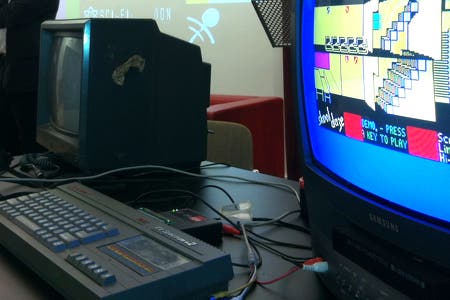Of Raspberries and Spectrums
The past and future of home computing collide at Horizons, a celebration of the ZX Spectrum.
"There's something happening here," sang Buffalo Springfield in their 1967 hit For What It's Worth. "What it is ain't exactly clear." It's a sentiment that well suits the games industry in 2012, as the structure that has endured for the best part of a quarter century is starting to show unmistakable signs of collapse. Major studios are fragmenting into small indie teams, 2D mobile games are out-grossing multi-million dollar boxed product and the production methods, retail models and market wisdom that have guided the medium for decades are all starting to wobble.
Nothing is working the way it should, but perhaps things are starting to work the way they used to. That's the prevalent mood at Horizons, a weekend event at the BFI's Southbank Centre, where dozens of people touched by the hand of Sinclair convened to reminisce about the heyday of the British home computer boom. It also served as a showcase of sorts for the Raspberry Pi, the much ballyhooed £20 PC that aims to get kids coding again.
As the highbrow location suggests, Horizons aimed to be much more than a fan convention for people to wax nostalgic about Monty Mole, although there was, inevitably, plenty of that and, yes, I did end up buying a commemorative Jet Pac t-shirt. Running as part of the Sci Fi London festival and supported by creative arts website Imperica, Horizons was both a celebration and exploration of how the first wave of home computers impacted British culture at large.
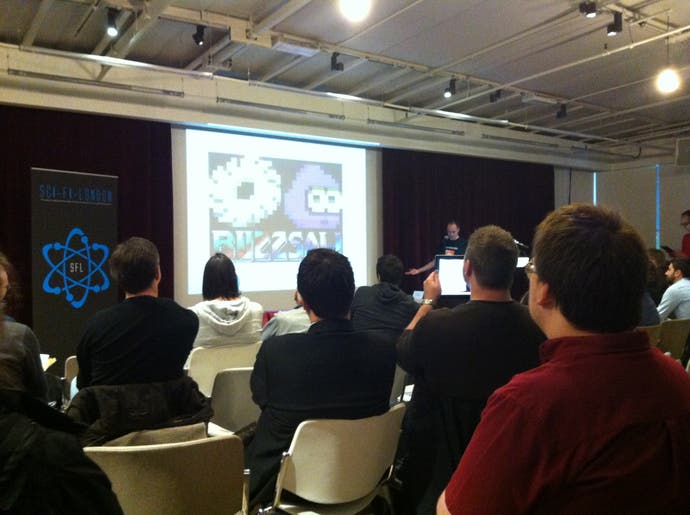
With such a broad target to hit, the line up of speakers was, rather appropriately, both playful and eclectic. Things kicked off in tuneful style with MJ Hibbett performing his viral ode to retro gaming, Hey, Hey 16k. It's a shrewd opening, as the line "it made a generation who can code" neatly encapsulates what became the theme of the weekend.
Computing history buffs were catered for with a talk from PJ Evans, former Crash writer and tour guide at Bletchley Park, in which he tracked computing from, as he put it, Colossus to colour clash. More Spectrum specific anecdotes came from the erudite and witty Rupert Goodwins, who went from teenage hacker to Sinclair employee and had the honour of breaking down in a C5 on the Hammersmith flyover. Far from an (Alan) sugar-coated trip down memory lane, the ridiculously entertaining Goodwins is open and honest about the shambolic nature of Sinclair's operation.
Adding a splash of artistic flair, musician and educator Matthew C. Applegate and digital artist Alex May both explained how the Spectrum inspired them to follow their own distinctive career paths, while TV director Saul Metzstein talked about Micro Men, his 2011 BBC Four drama that centred on the rivalry between Sinclair and Acorn. Even though Metzstein now works on Doctor Who and shot second unit for the new Judge Dredd movie, it's revealing that only one of the questions from the audience is about these more mainstream topics. Of greater interest to the assembled 8-bit evangelists are the vintage hardware on display in the film, whether that really was a prototype C5 in the opening shot and if Sir Clive really did throw phones through windows (answer: yes).
This, clearly, was a meeting of enthusiasts so it makes sense that some of the most popular talks came from fellow hardware tinkerers. Dylan Smith takes the stand to explain how he developed Spectranet, an ethernet card that allows the Spectrum to post to Twitter. Chris Smith, meanwhile, documented his mind-boggling quest to reverse engineer the Spectrum - down to the internal design of its microchips - and build a new model from scratch using modern components.
In one of the weekend's most crowd-pleasing moments, chiptune composer Matt Westcott stunned the crowd by taking a suggestion for a song from the audience - Rickroll classic "Never Gonna Give You Up" - and composing a note perfect Spectrum version, live on stage, in less than an hour.
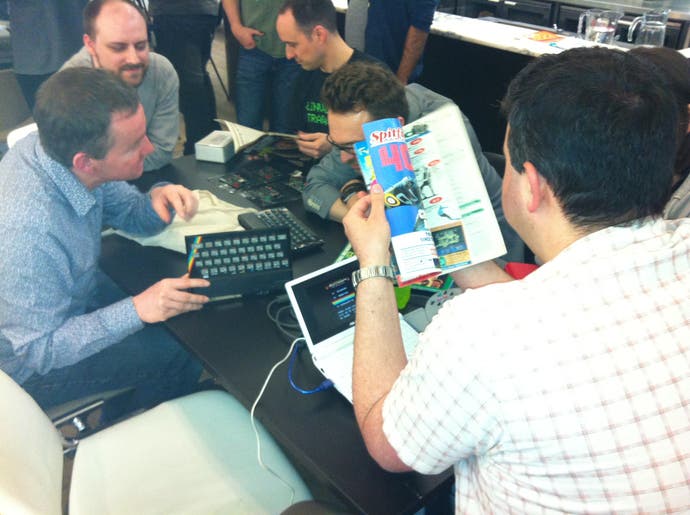
Sunday also saw the Antics Roadshow, as attendees shared and showed off their Sinclair ephemera. Beloved old computers covered the tables, Kempston joysticks sprouted like flowers and dog-eared copies of Crash and Sinclair User were eagerly consumed.
Across the two days there was a beguiling mixture of honest fandom and technical symposium, though the relative absence of any specific gaming talk was slightly disappointing. Interviews with legends such as Jon Ritman and Mel Croucher are run online, but there's otherwise a surprising lack of actual games development talk at the event itself.
Though this might make a middle-aged games writer feel sad, it seemed in keeping with the mood of the show, which was more forward-looking than you'd expect a retro gaming event to be. Far from being a melancholy look at the past, it was a joyous celebration of how childhood inspiration has propelled people to success in multiple fields.
The Spectrum may be obsolete but it's far from dead, with dedicated retro labels like Britain's Cronosoftand Spain's Relevo still offering new titles either as emulator downloads or actual Speccy cassettes. Coder Jason Railton, a regular on the World of Spectrum forums, is in the audience and his latest game, the excellent puzzler Buzzsaw, is used onscreen in more than one demonstration. He's managed to beat the Speccy's notorious attribute clash problem, and attracts approving gasps for his trouble.
I ask him why he's developing for a thirty-year old home computer when he has a game that would seem perfectly suited to the iPhone, and he's dismissive of Apple's platform. Most games struggle to make money on iOS, he believes, so why not just develop for a system you're really passionate about, one that will challenge your programming skill?
Passion is a word that keeps cropping up over the weekend, both from the lectern and in the barstool chatter. People were - and still are - passionate about the Spectrum in a way that I haven't seen with any other gaming platform. There's a warmth to the Spectrum community that transcends simple nostalgia for a fun toy.
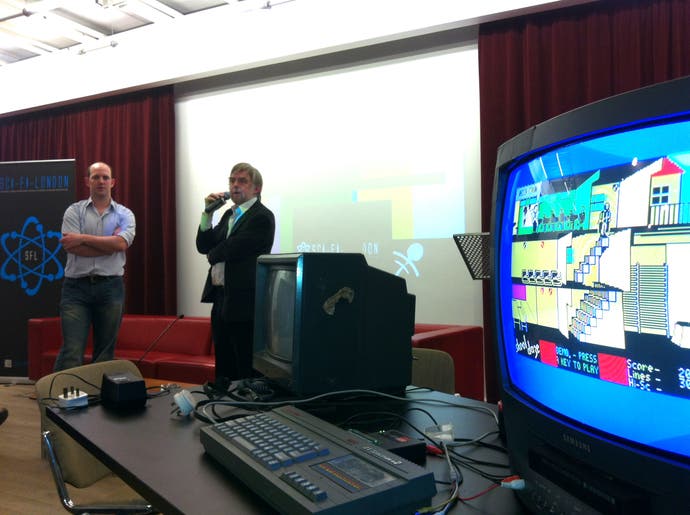
Much like Oli, who expressed his debt to Sinclair so beautifully, I was one of that generation of Spectrum kids and looking back it's clear that this fondness comes from a deeper place than midlife crisis fuelled nostalgia for Thundercats and the bright green synthetic drink known as Quatro. I feel no such deep attachment to my SNES, PlayStation or even Amiga. The Speccy was special, and after Horizons I finally know why.
The Spectrum, like all early computers, forced you to interact with it. If you wanted to play a game, you had to enter LOAD "", a tiny coded gateway of Basic that gave you an inkling of how the machine worked. Sinclair's genius, of course, was that these commands were scattered across the keys, unavoidable rubbery runes of GOSUB and RAND daring you to decipher their purpose. It's no wonder that the early games magazines dedicated entire sections to programs you could type in yourself, most in Basic, some in the terrifying wall of hexadecimal that was machine code. The secrets to how games worked were right there, in full view, for those intrigued enough to look. Today, we hit download or insert a disc and let our consoles and phones do all the heavy lifting, the guts of the medium discretely tucked away so it won't scare us off.
"I think it's a real shame," Leila Johnston, Imperica's Editor at Large and co-host of the Horizons event, tells me when we grab a quick chat before Sunday's session kicks off. "At the moment there's this culture in technology of 'you don't need to know anything, we'll do it all for you', as if there's this mysterious super-race of programmers and you pay them as much money as they ask for because they have this knowledge we don't have. It's just accessibility. In the '80s, the games you played were accessible, you could load the code and see how it worked. That inspired you. You could know the whole machine."
The importance of not shying away from the guts of game design is an issue that David Braben also touches on when we talk prior to the event. "I went through my loft the other day," he says, "I was donating some manuals and magazines to a museum, and what's interesting is that within the first five or ten pages of the Commodore 64 manual it's telling you how to write a program. Not how to load a program, how to write a program. That's the difference."
In the pursuit of mainstream acceptance, have we lost our willingness to understand how computers work? According to Braben, the code itself hasn't changed all that much. "Platforms like iOS are essentially based on Linux," he insists, "As is Android, as are many other systems. It's just very well hidden. The question for us when it comes to Raspberry Pi, creating an educational version later this year and also a consumer version, is do we hide the boot sequence or do we hang it out for all to see?"
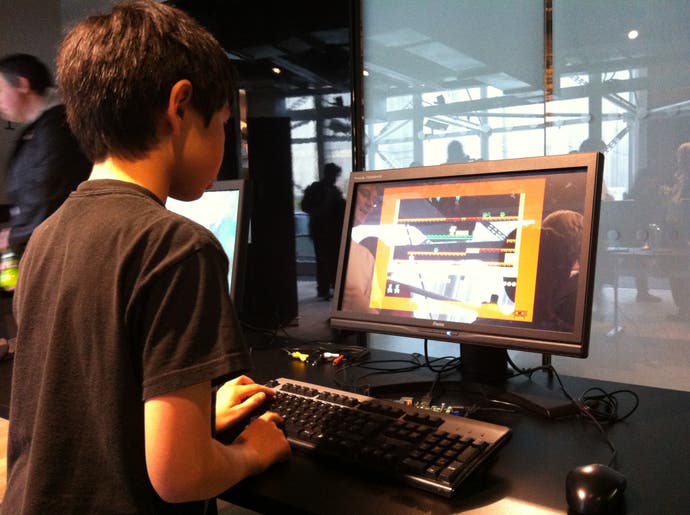
Aah, Raspberry Pi. If Horizons has a second flavour after the rainbow Spectrum swirl, it's definitely raspberry. There's a thread of idealistic intent linking Sinclair's low-cost 48k home computer and its 21st century heir apparent, a desire to get Britain coding, and so even though the Pi contains more power than a hundred Speccies, they definitely feel like kindred digital spirits. If you wanted to illustrate the past and future of home computing, you couldn't ask for a more neatly packaged symbol than the sight of a young child using Raspberry Pi to play Manic Miner through an emulator.
Can a £20 pocket-sized PC really revive the spirit of Sinclair and transform a generation weaned on closed-system consoles and smartphones into the next wave of British bedroom coders? The world has changed a lot since 1982, and for all their similarities, Raspberry Pi is the exact opposite of the Spectrum in some important ways. The Speccy was a mainstream mass market product that turned its users into digital tinkerers. Raspberry Pi, in its current form at least, is a tinkerer's machine that hopes to go mass market.
On Sunday afternoon, Raspberry Pi's designer Eben Upton is joined by Dr William Marshall from hardware partner RS Components. Thankfully, they prove to be very aware of the different hill they must climb compared to Sir Clive back in the day and the weekend draws to a close on an upbeat note. Past, present and future in alignment. It feels right. Gaming has never been more mainstream, the public appetite for simple and imaginative games never more obvious, game developers never more incentivised to give them what they want. If we're ever going to see a return, in one form or another, to the halcyon days the Spectrum represents, now is clearly the time.
As the assembled ZX enthusiasts head to the bar for one last 8-bit toast, I'm reminded of an anecdote that David Braben shared as we discussed the golden years of home computing over the phone. He recalled meeting an ambitious young programmer who pitched for the job of converting Elite to the Spectrum. His name: Peter Molyneux. If there's another Molyneux currently revising for his GCSEs, dreaming of one day making games, maybe it'll be Raspberry Pi that keeps him coding.
